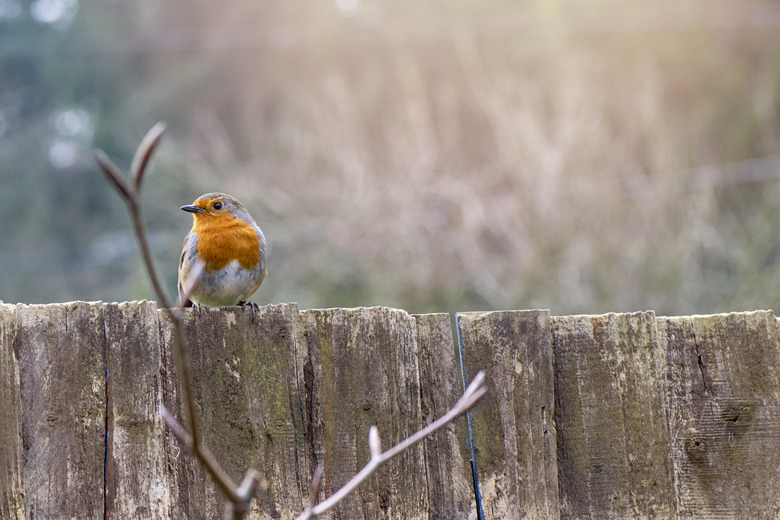How To Prevent Birds From Pooping On Your Fence And Other Surfaces
It's a fact of life that poop happens. But when birds are making it happen on your fence, deck, car, patio, or other property, accepting this idiom gracefully becomes much more difficult. Not only is bird poop (technically called guano) unpleasant to look at, but it also contains uric acid, which can eat through many building materials as well as the paint on your car. Although not an issue for most people, those with weakened immune systems may be prone to contracting illness through the micro-organisms contained in bird guano, which are released when the bird's waste is disturbed.
While you need not worry about occasional fly-by droppings, the potential for damage and illness makes it important to address poop problems when you have a lot of birds on your property or a few problem poopers who have taken up residence. The only way to truly solve the problem is to exclude the birds where you can and try to convince them that they would rather be somewhere else. You can do this, but it will take some tenacity on your part. We may call people "bird brains" when they do something foolish, but birds are actually quite smart. The oft prescribed shiny objects and scary noises don't work for long — eventually the birds figure out that these deterrents are all bark and no bite.
How to Prevent Birds From Pooping on Your Fence
1. Identify the Bird Species
Before you start disturbing the birds on your property, take the time to figure out what kind of birds they are. This is a critical step. State laws, the federal Migratory Bird Treaty, and the Endangered Species Act all offer legal protection to some bird species. These laws may limit what steps you can take to eliminate the birds and may prohibit you from disturbing some species at all.
- Take a picture of the bird, if possible. If not, you should still try and note any unique coloration or markings.
- Note when you see the birds. Are they active in the morning or do they prefer dusk?
- Record the bird's song if you can.
- Research the properties of your particular birds on the internet. If you still can't determine the species, take all of the information you have gathered to a local ornithologist and ask for identification assistance.
- Check the laws now that you know what type of bird you're dealing with to make sure you can legally proceed.
2. Make Your Property Uncomfortable
The first step to discouraging unwanted bird visitors is to make sure you haven't inadvertently rolled out the welcome mat for them. Obviously you'll want to avoid having a birdbath or bird feeder, but there are other steps you can take to encourage birds to keep moving.
- Caulk any holes in your home or roof eaves that may allow birds to enter or nest. For larger areas, apply bird screening rather than caulk to keep birds out.
- Place large bird nets over any tasty treats in your garden. Birds are particularly attracted to fruit trees and berries. Cover them to prevent birds from scoring a free meal.
- Surround your water features with dense plants and rocks. If you have a decorative pond, surrounding it in this way makes it harder for geese and ducks to easily climb in and out of the water. This will discourage them from visiting your pond.
- Consider a pet. Some dogs like to chase birds, and cats often view them as a tasty snack. Your new furry friends won't be able to deter high-roosting or airborne birds, of course, but they can make ground landings quite unpleasant.
3. Try Some Scare Tactics
There are a number of shiny objects, noisemakers, and fake predators on the market today designed for scaring off birds. Some can deter birds for a time, but none are likely to prove permanent solutions on their own. The deterrents that work best are those that behave unpredictably.
- Mount some helium balloons in the area where you see birds. Balloons often work well as a deterrent because they bob unpredictably in the wind. They're always moving, and there is no pattern to their movement. Replace the balloons when they deflate, putting them in a different area each time.
- Hang a windchime on your patio or another area where you want to discourage birds. Unlike other noisemakers, wind chimes have no predictable pattern. As such, it may take birds longer to get used to them.
- Try a flying owl. Owl decoys don't work for long, but decoys of moving owls that appear to be in flight are more effective than their stationary counterparts.
4. Discourage Roosting Behavior
Birds understand that they're easy pickings for predators when they're on the ground, and as such like to rest and roost in high places. There are several steps you can take to discourage this behavior.
- Trim bushes and trees. Large flocks need large roosting areas, so make sure your trees and shrubs aren't providing ample space.
- Install bird spikes on your roof, window sills, fence, and other areas where you see birds roost. These spikes prevent the birds from landing. If these admittedly unattractive spikes bother you, string microfilament in tight rows across these surfaces instead. This will still prevent roosting but won't be as noticeable.
- Supplement your bird spikes with sticky repellents. These sticky sprays and strips annoy birds who try and roost on them. Sprays are easy to use and you can apply them to trees where birds roost as well as on buildings and other structures.
